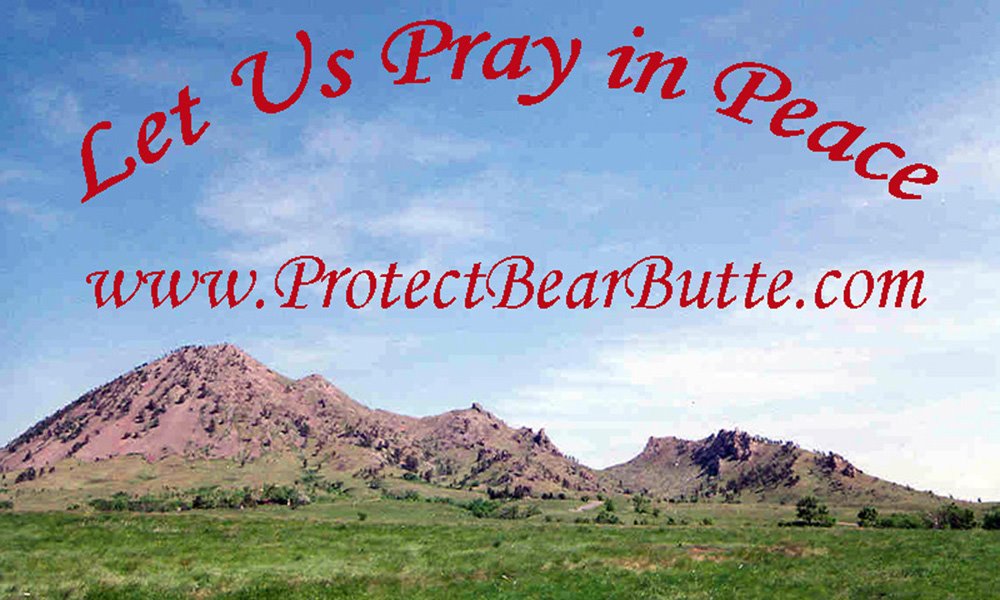Bear Butte liquor license dispute headed for state Supreme Court
Posted: January 29, 2007
by: David Melmer / Indian Country Today
PIERRE, S.D. - The South Dakota Supreme Court has received an appeal on a lower court decision to not allow petitioners a chance to veto the issuance of a malt beverage license near sacred Bear Butte in the northern Black Hills of South Dakota.
The battle to stop owners from opening huge biker bar venues within sight and sound of Bear Butte grew this past summer and challenges the Meade County Board of Commissioners' policy that allows liquor licenses near the mountain.
Attorney Thomas Van Norman, a member of the Cheyenne River Sioux Tribe and the tribal attorney, filed the appeal on Jan. 14 on behalf of the petitioners.
The appeal is in response to the circuit court order that denied petitioners a writ of mandamus that would have compelled Meade County, in which Bear Butte is located, to hold a referendum vote on the malt beverage license issue.
During the first week of every August, 500,000 bikers converge on the normally small community of Sturgis, located just three miles from Bear Butte. Large-venue entertainment complexes located within sight and sound of Bear Butte offer entertainment and encourage the bikers to party.
Entertainment complexes or stadiums that can accommodate some 30,000 people are either being constructed or are in operation nearby.
Bear Butte is considered one of the most sacred of sites by numerous Great Plains tribes. Oral histories point to the mountain as the source of the spiritual life of the Cheyenne, Crow, Lakota, Shoshone, Arapaho, Kiowa and nearly 25 other tribes.
Members of the various tribes pray on the mountain nearly every day of the year. Many American Indian soldiers who are deployed to Iraq and Afghanistan pray on Bear Butte before they leave and after they return. Families pray for ill members and many individuals seek visions on the mountain. Bear Butte is also a state park.
During the Sturgis Rally, those who pray assert that noise and other distractions from the music and the non-muffled bikes disturb their concentration and meditation. A camp composed of people from many American Indian nations gathered on the mountain for more than a month this past summer to bring awareness to the sacredness.
Support for the tribes has come from many local ranchers who also see a need to curtail the growth of the rally industry.
The trigger for the rallies and protests came when Jay Allen, owner of a new campground, bar and entertainment complex, applied for a malt beverage license for a new venue to be located just to the north of the mountain. He also owns the Broken Spoke campground and bar, located north of the mountain.
A petition to request a referendum vote on the license was filed with the county auditor within the legal time after the commission approved the license. The auditor certified the petition, but the commission unanimously voted to reject a referendum vote based on administrative decision.
The case was then sent to circuit court, which found in favor of the county.
Petitioners in the case contend that applications submitted by Allen were not treated properly by the county commission. Allen's first application, submitted in April 2006, the petitioners argue, asked for a new malt beverage license to be used at the new venue near Bear Butte. It was issued on June 9.
Also in April, Allen submitted an application for the renewal of an existing malt beverage license at the Broken Spoke. The petitioners argue that both license applications were treated similarly. The renewal was subject to only a check of sales tax licensure and comments from law enforcement on potential calls over problems at the location of the license.
Petitioners argue that a complete background check - required for new licenses - was not completed and that the commission used the same criteria as for a renewal.
In their brief to the state's high court, the petitioners further argue that the circuit court erred in its decision to deny the petitioner's first request to hold the referendum.
They also contend that the county commissioners denied the petitioners their constitutional and statutory rights by refusing to print ballots and hold the referendum vote.
The petitioners pointed out that both the legislative and administrative actions of municipal governments are subject to the referendum process in the state of South Dakota. The county commission denied a referendum based on administrative procedure.
Legal precedence points out that any decisions made by counties or municipalities on liquor licenses are subject to referendum. The law also is clear, the petitioners argue, that the discretionary powers afforded to the county commission is legislative and therefore subject to referendum.
It is not clear whether a new referendum would overturn the county commission's decision to issue two malt beverage licenses to Allen. Allen also succeeded in purchasing a full liquor license from a steak house in the county that has since closed.
http://www.indiancountry.com/content.cfm?id=1096414397
Monday, January 29, 2007
Subscribe to:
Comments (Atom)



